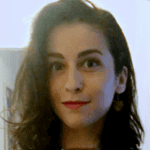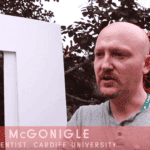Profile
David McGonigle
Lookin forward to taking part in more live chats!
-
About Me:
I’m a neuroscientist (so I look at questions in psychology primarily using a biological perspective). I love dj’ing (although I’m rather rubbish, sadly…), cooking, reading, and writing short stories.
-
Read more
Hi – I’m Dave! I’m spectularly terrible when it comes to writing about myself, so I’ll try to be brief: I’ve been fascinated by the brain for longer than I can remember, probably ever since I read, watched and just generally consumed far too much science fiction as a teenager.
I quickly discovered, though, that my books and films had lied to me: most scientific questions took rather longer than 2 hours or 300 pages to solve. To make matters even worse, I quickly learned that you didn’t tend to get a medal, vast amounts of money, or adoring crowds of fans once you’d done so.
Once I got over the dissapointment, though, (sniff!) I learned to love the whole process of doing science! Designing experiments can be as creative as writing a book or drawing a picture, and solving all the many problems that come up along the way is endlessly challenging (and frustrating!). You don’t need to be an (evil) genius to be a scientist, just someone that is fascinated by the world around them, and want to understand it better so others can, too. My pronouns are he/him.
-
My pronouns are:
He/Him
-
My Work:
I study the human brain, using scanners that directly record it working, and stimulators that allow me to change how it works. Sometimes, I even do both at the same time!
-
Read more
As I suggested above: I’m terrible when it comes to writing about myself (I know, I know…), and so I look forward to actually chatting to some of you and answering your questions to allow me to explain what it is I do!
But, in a nutshell: I study the human brain. Unlike a lot of psychologists and neuroscientists, I’d be stuck to actually name one particular question, disease, issue, or theme that has been the focus of my work so far – I’m more like a bit of a research magpie, always being distracted by the shiny ideas just out of reach!
My degree in Neuroscience was completed just around the time that brain scanners were becoming the next big thing, and so my PhD ended up being based in what was the only laboratory in the UK at the time to have a research-dedicated MRI scanner. Now, MRI wasn’t new – it was being used instead of x-rays to take detailed pictures of the human body by then. What was new was something called ‘functional’ MRI – a new way of interpreting the signals from the scanner to produce not just pictures, but movies of the brain.
And not just of the brain’s structure – this new idea allowed us to record the brain’s activity, so that we could look inside each of our participant’s brains while they were doing an experiment, and see where, when and how their brains were working.
I was lucky to be a PhD student in this lab, which gave me access to resources and people that I just wouldn’t have had elsewhere. It also meant that I was lucky enough to be involved in projects including everything from mapping phantom limbs in the brain to philosophical debates on ‘consciousness’. I was around a lot of smart people, and I learned a lot from all of them – never be afraid to admit you don’t know something (I wasn’t!).
But what drove me then, and continues to drive me today, is a rather basic question. It may seem a bit boring to some of you, but being around all the incredible machines and amazing experiments in those days made me wonder: just how good is the information that we get back from these machines? When have we ‘discoved’ something? When is an experiment ‘finished’? What can you actualy say at the end of an experiment when you’ve only studied 12 or 20 people? As a statistician friend of mine at the time used to say ‘Dave is a Neuroscientist with a Methods problem…’. And, even though these days I tend to focus on something called Brain Stimulation – a way to use small electric currents to change and hopefully correct brain activity in both health and disease – I’m proud to say that, yes, I still have a Methods problem. Long may it continue!
-
My Typical Day:
My days are a mixture of experiments, teaching students, and – if they’ve worked… – trying to figure out what my experimental results mean! I use members of the public as my participants, and it’s interesting and challenging to get to work with new people every day. And stare at their brains, of course!
-
Read more
My typical day is a tough one to summarise – as you get a bit older in science, you tend to do less actual ‘hands-on’ work. However, the less of a science superstar you are, the more you have to do yourself, and so, for my sins, I can often be found in one of the many laboratories in CUBRIC (the brain imaging and stimulation labs in Cardiff University), twisting wire, attaching electrodes to participants’ heads, or just generally looking worried at squiggly lines on a computer monitor!
CUBRIC is a massive custom-built building (if you stacked its 68,000 bricks in a vertical column, they would stretch higher than Mount Kilimanjaro!), and there are always projects going on using its many different scanners and experimental rooms. For my work (which I’d always be doing with a collaborator, anyone from another lecturer to a PhD student) I need to recruit members of the public. Once people express an interest, they visit CUBRIC, where they fill out many, many safety questionnaires – we want to be very careful when putting people in big magnetic fields, or when sending electric current into their brains!
It’s usually this phrase that gets people a wee bit nervous: you don’t usually see the words ‘brain’, ‘electrical current’ and ‘healthy volunteer’ in the same sentence. But the kind of brain stimulation that I used, tES (or transcranial electrical stimulation) isn’t really like you may see on TV or in the movies. For examples, I was rewatching Stranger Things recently, and I shuddered when one of the characters was hooked up to an electrical stimulator which was being used to erase her memories. THAT kind of stimulation always makes people judder and shake. MY kind of stimulation is more like a tickle: you can feel it on your scalp, but it’s not painful or particularly powerful – it’s more designed to ‘nudge’ the workings of a bit of the brain in a certain way.
Let’s say there’s a particular brain disorder that doctors think only involves one part of the brain. Maybe there are drugs that help for this, but typically there will always be patients who don’t respond well, or don’t like the side-effects. Using tES, and attaching some electrodes to the head in a way that targets a particular bit of the brain, it’s possible to control how that brain area works. You can control the activity in both directions, a bit like a volume control – turn it up, and the area is more active. Turn it down, and it ‘fires’ less – which is important in some brain disorders like epilepsy, where one part of the brain can be way too active and cause all sorts of problems.
The trouble is, while my little ‘volume’ idea is a nice way to explain things, the reality is that – you guessed it – things are way more complex. Sometimes the technique works. Sometimes it doesn’t. It seems to work well in some people all the time. Others – never. So a lot of my work is focused on exactly this. Instead of the cool and dashing race car driver, I’m more of an oil-stained mechanic, fiddling with the gear and trying to ensure that we understand it better before it gets used in hospitals and on patients in a more widespread manner.
So an experimental day will be me and my colleagues taking our participants, attaching electrodes to their heads, getting them to do simple experimental tasks like moving fingers or pressing buttons as quick as they can while sometimes we feed electricity into their brains. Only sometimes, though, so we have a ‘control’ condition to compare our ‘active’ results to. We’ll often do this while participants are in our scanners, as well, and try to track and understand where in the brain the electricity is going. Sometimes a given experiment only takes 30 mins to setup. Sometimes it can be 90 minutes before we actually start to collect data (hey, the participants get paid, so they’re happy!). But nothing beats a successful day of data collection after all that hard work, where you’re sure that you’ve got some great quality data to think about. Then the hard work actually begins – trying to analyse it all!
-
What I'd do with the prize money:
I’d donate the money to a charity working in neuroscience research: MIND, Parkinson’s UK, and Autistica are three organisations that come to mind. But I’m also open to any ideas from participants in the chat!
-
Education:
Our Lady of the Missions Primary, Glasgow.
St Ninians High School, Glasgow.
Glasgow University, Glasgow. -
Qualifications:
5 A Highers (English, Maths, Modern Studies, Physics, Chemistry). 2 SYS A* (English, Physics). You may notice the lack of Biology in any of my options (also – no psychology, although there were no psychology options in those days) – more on this later!
1st Class BSc(Hons) in Neuroscience, University of Glasgow.
PhD in Functional Neuroimaging, Institute of Neurology, University College London. -
Work History:
Paperboy.
Door-to-door Salesman.
Apprentice Civil Engineer, Lilley Construction (actually called a ‘chainboy’ – please don’t google that).
These were all summer jobs before I went to Uni, and were really useful in showing me a little of what the real world was like beyond school. In particular, being a chainboy for a summer introduced me to actual ‘work’ – I will never forget the feelings of complete exhaustion after finishing a full day’s grind on a building site.
I needed a source of income while I was at Uni, and so I worked in a supermarket, usually 2 nights a week with a weekend shift. Again, while it was hard work, there were a lot of other students there, and it was a good environment to meet people from outside your own course. -
Employer:
Cardiff University
-
My Interview
-
How would you describe yourself in 3 words?
Bald Brain Botherer
What did you want to be after you left school?
Boring, but I did want to be a scientist, even though i had NO idea what that actually involved.
Were you ever in trouble at school?
Yup...I used to have my desk moved away from the rest of the class for talking too much.
If you weren't doing this job, what would you choose instead?
No idea!
Who is your favourite singer or band?
...an impossible question. Changes daily. Happy to be asked!
What's your favourite food?
Japanese cuisine.
If you had 3 wishes for yourself what would they be? - be honest!
Mad Dj-ing skill(z). A full head of hair. A (limited) ability to rewind time by 5s to avoid saying stupid things in public!
Tell us a joke.
You need a scottish accent for this: 'What's the difference between Fred Astaire and Walt Disney? Fred dances, and Walt Disney.''
-







